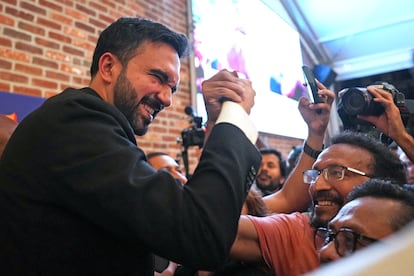Zohran Mamdani’s win in New York ignites debate over Democratic Party’s future
He’s 33 years old, a social media powerhouse, and a likely contender to become the city’s new mayor. Does his victory signal a new path forward for the American left?


A Star Is Born is a 1937 film about the hardships of show business, starring Janet Gaynor. In addition to inspiring three successful remakes (with Judy Garland, Barbra Streisand, and Lady Gaga), it also helped coin a well-worn trope — one that applies to politics as well. And so, on Tuesday night in New York, a star was born. His name is Zohran Mamdani, a 33-year-old member of the State Assembly who, after defeating former governor Andrew Cuomo — a candidate of the old guard — in the Democratic primaries, is on his way to becoming, thanks to a jubilant campaign smartly powered by social media, the city’s first Muslim mayor and also the youngest in its modern history.
His win lit up not just the most populous city in the United States — which tends to vote Democrat and is therefore likely to end up in Mamdani’s hands in November — but also cast light on the national political scene, sparked a degree of global excitement, and shone a spotlight on his party, the Democrats, who are currently lacking leadership and mired in a debate about how best to stand up to Donald Trump and win elections again. For example, the 2026 midterms, which will determine control of both chambers of Congress, or the 2028 presidential election.
Will this new rising star lead the Democrats out of the hole they are in? And more importantly: is it time to give the party’s left wing — which Mamdani belongs to — a real chance? After all, Mamdani defines himself as a socialist, a near-taboo word in U.S. politics.
On Thursday, Mamdani — who proudly considers himself “Trump’s worst nightmare as a progressive Muslim immigrant” (he was born in Uganda, arrived in the U.S. at age seven) — went through another rite of passage in contemporary Washington: becoming a target for Trump. On his social network, Truth Social, the president — himself born in New York — called him a “100% communist lunatic,” then moved on to personal insults aimed at him and the “dummies” who supported him, including Bronx Congresswoman Alexandria Ocasio-Cortez (AOC). Her own surprise win in 2018 — another example of a young candidate defeating the establishment — also shook the foundations of the Democratic Party.
This week, the most common question on the American left has been whether it’s realistic for the Democratic Party to embrace Mamdani’s approach. No, he’s not a communist, and he won the primaries against a rival with a corrupt past by proposing measures for a city suffering from sky-high living costs: free buses, a rent freeze, and a pilot program for municipal supermarkets.
“Obviously, [Tuesday’s victory in New York] is a major victory for the party’s left and a confirmation of the strong support a populist platform enjoys among progressives, and many others, at least in a large city like New York,” says Georgetown professor Michael Kazin, author of a comprehensive history of the Democratic Party.
Kazin advises, however, “not to get too excited about Mamdani’s achievements so far.” “He didn’t win a majority of the first-place votes, and the rest went to more moderate candidates. And, as always, Democrats win in key states like Wisconsin and North Carolina only if they manage to combine the energy of progressives with rhetoric and programs that appeal to those not ready for radical change,” he notes.

Kazin sees a parallel with AOC and Senator Bernie Sanders (“no one expected their successes or their influence in the party”), but he doesn’t see the moderate wing experimenting with socialism, even though it’s clear they need to do something.
Built from scratch
Mamdani’s campaign, built from the ground up, offers an alternative to the strategies of a party that has spent months licking its wounds — distracted by theories like the one promoted by famed strategist James Carville, which can be summed up as “play dead” and let Trump crash on his own — and attempting to mimic Republican tactics, such as appearing on the same manosphere podcasts that helped Trump win over men in the November presidential election.
Communications strategist Rebecca Kirszner Katz wrote in an article in The New York Times on Thursday that Democrats would do well not to fear Mamdani and instead “learn from” his win. “But I worry they won’t,” she added. “Democrats have a curiosity problem, and it’s losing us elections.”
Among the lessons to be drawn from his success, according to Katz, is his ability to win over young voters — with videos like the debate clip attacking Cuomo that reached 10 million views on X. Beyond mastering virality, Mamdani has set himself apart — by supporting, for example, Palestine and denouncing the “genocide” in Gaza — from the party line, which in the last presidential election alienated many young voters with its support for Israel and its insistence on backing old-guard candidates (if not outright members of Washington’s gerontocracy). Meanwhile, Republicans successfully spread the message that Democrats are elites who are disconnected from the problems of ordinary people.
Mamdani’s own ties to those elites — intellectual elites in his case; he is the son of filmmaker Mira Nair and Columbia postcolonial studies professor Mahmood Mamdani — are a vulnerability that conservative media and his main November rival, current mayor Eric Adams, are exploiting. Adams, a former Democrat with ties to Trump and his own corruption scandals, is running as an independent. On Thursday, he quipped: “This election is a choice between a candidate with a blue collar and one with a suit and silver spoon.”
Republicans are also playing the elitism card, though they seem quite happy with the profile of the Democratic Party’s rising star. “Mamdani is Democrats’ ideal candidate,” said the Congressional Leadership Fund — dedicated to raising money for conservative House candidates — in a sarcastic statement last week. The statement included a line that encapsulates (and stokes as a boogeyman) many moderate voters’ fears: “[He’s] a socialist who wants to abolish the police, get rid of prisons, abolish medical bills and private health insurance, legalize sex work, end cash bail, and ban all guns.”
At the other extreme, Stephanie Taylor, co-founder of the Progressive Change Campaign Committee, said in a statement that Mamdani’s likely victory “shows that a new direction for the Democratic Party is possible — a future of dynamic candidates who appeal to young voters and working-class voters with a platform that fights for people, not corporations.”
“The old guard establishment of the Democratic Party, fueled by billionaires, did everything they could to defeat Mamdani — and they failed," Taylor added, referring to the fact that Bill Clinton and Michael Bloomberg supported Cuomo. “They continue being wrong about everything, and they need to get out of the way and let a new generation lead.”
Despite Mamdani’s fresh energy, it’s unclear whether Democrats are ready to listen to Taylor. So far, the shortlist of possible candidates for the 2028 presidential election — including former Chicago mayor Rahm Emanuel — hasn’t changed much from last year, when governors like Gretchen Whitmer (Michigan), Gavin Newsom (California), J. B. Pritzker (Illinois), or Transportation Secretary Pete Buttigieg were being floated as potential successors to Joe Biden or running mates for Kamala Harris.
In any case, Mamdani could never run for president — he wasn’t born in the U.S. For now, he has his hands full just trying to prove he’s not a shooting star. That is, securing a win in November and making good on the Nelson Mandela quote that he’s already being associated with after citing it in his victory speech: “It always seems impossible until it’s done,” he told supporters in New York. “My friends, we have done it.”
Sign up for our weekly newsletter to get more English-language news coverage from EL PAÍS USA Edition
Tu suscripción se está usando en otro dispositivo
¿Quieres añadir otro usuario a tu suscripción?
Si continúas leyendo en este dispositivo, no se podrá leer en el otro.
FlechaTu suscripción se está usando en otro dispositivo y solo puedes acceder a EL PAÍS desde un dispositivo a la vez.
Si quieres compartir tu cuenta, cambia tu suscripción a la modalidad Premium, así podrás añadir otro usuario. Cada uno accederá con su propia cuenta de email, lo que os permitirá personalizar vuestra experiencia en EL PAÍS.
¿Tienes una suscripción de empresa? Accede aquí para contratar más cuentas.
En el caso de no saber quién está usando tu cuenta, te recomendamos cambiar tu contraseña aquí.
Si decides continuar compartiendo tu cuenta, este mensaje se mostrará en tu dispositivo y en el de la otra persona que está usando tu cuenta de forma indefinida, afectando a tu experiencia de lectura. Puedes consultar aquí los términos y condiciones de la suscripción digital.








































